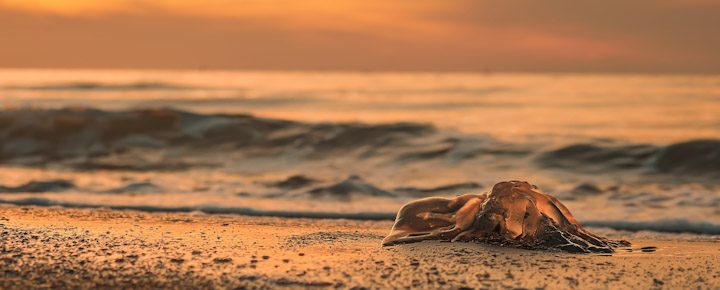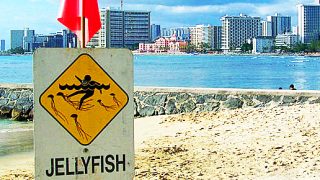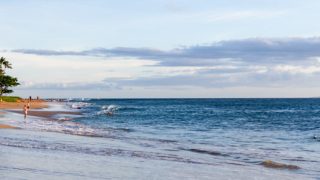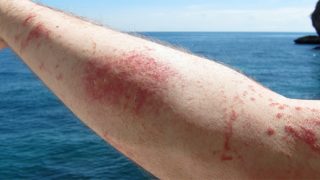Your next Hawaii vacation can be virtually jellyfish sting-free with today’s updated 2023 Hawaii Jellyfish sting warning calendar below. We have also included news on the latest research and suggestions for you. This calendar is helpful when looking for the best Hawaii vacation dates. Also, keep these in mind for this week’s Cyber Monday and Travel Tuesday shopping.
Jellyfish are themselves fascinating creatures made up of 95% water. Their needle-like venomous stingers are located on tentacles. Stingers shoot the toxin into victims in one-millionth of a second upon activation. The jellyfish types in the islands include the box, moon, and lagoon varieties.
What causes box jellyfish invasions?
Jellyfish show up at the same time each month. Why has the problem become worse, and where do they come from? A recent study conducted over 10 years at UH Manoa addressed these questions and more. Here’s what they found:
- A “key number of hours of darkness during the lunar cycle” triggers jellyfish to come to affected shores. In particular, the number of hours between sunset and moonrise is critical to this cycle.
- Jellyfish are spawning. They come to the beach to reproduce.
- There are more than 40 jellyfish species. But those found in Hawaii are “the only species that exhibits this clockwork lunar spawning migration behavior.” The same variety is found in Key West Florida, Puerto Rico, and Saipan.
Avoiding Hawaii jellyfish stings – Awareness First
1. Location. Hawaii’s south-facing beaches are impacted by box jellyfish 8 days following each full moon. On Oahu, beaches, including Ala Moana Beach Park, Hanauma Bay, Waikiki, and the Waianae Coast are impacted. Kauai beaches that see jellyfish include Poipu Beach and Salt Pond Beach. There can also be jellyfish on Maui and the Big Island on south-facing beaches, but it is less common.
2. Timing. While jellyfish will start to be prominent at Pacific Ocean beaches in Hawaii 8 days after the full moon, the problem persists for up to 3 days. If you’re on an impacted beach while jellyfish are present, speak with a lifeguard first for advice. Also, seeing jellyfish on the beach is a good indication of their presence in the ocean.
3. When you get stung, here’s what to know. There’s a great deal of recent research about jellyfish, and the University of Hawaii, a leader in the field, has created a topical treatment, that should be available soon.
Jellyfish have long been a problem in Hawaii, and they only seem to be getting worse here and globally. In Australia, for example, we were advised to wear stinger suits at the Barrier Reef.
2023 Hawaii Jellyfish Sting Warning Dates
While a jellyfish sting can happen at other times, these are the most likely dates when problems may occur. Also, be on alert on the days immediately preceding and following these caution dates.
January 14 to 16
February 13 to 15
March 15 to 17
April 13 to 15
May 13 to 15
June 11 to 13
July 11 to 13
August 9 to 11
September 7 to 9
October 7 to 9
November 5 to 7
December 4 to 6
Jellyfish Sting Treatments
On this subject, there is a wide range of suggestions with anecdotal evidence regarding effectiveness. Do a Google search for “jellyfish sting treatment,” and you’ll get the idea.
Research indicates that some treatments can exacerbate the problem rather than help. For example, the age-old idea of scraping off tentacles is said to increase the intensity rather than improve it. That is because when you scrape the tentacles, you cause more of the venom to be released.
Preferred remedies include rinsing with vinegar and carefully removing tentacles with tweezers. Also, heat is frequently suggested to be better than ice in alleviating pain. Theoretically, the vinegar helps reduce the firing of the toxin while heat slows the venom. We’re not sure if that’s true, and we’d love to hear your thoughts.
1. Most important is to get medical help with any severe complications or shock. Symptoms that can be dangerous include swelling, severe rash, vomiting/nausea, severe headache or stomach ache, respiratory issues, muscle spasms, etc.
2. Rinse the area with vinegar to help deactivate toxins and carefully remove jellyfish tentacles. Others have suggested washing the area with ocean water to help.
3. Heat or cold may help, even alternating between them. That can reduce the severity of the pain and how long it lasts. Some suggest dipping the area in 104 to 113°F warm water for at least 20 minutes. A warm shower does the same thing. Iibuprofen or acetaminophen may help too.
4. We continue to use the After Bite itch eraser cream. It’s been around for years and is made of ammonia and baking soda. We also keep it on hand for bee and mosquito bites and use it with some degree of success. You’ll find a lot of other choices online too.
Mayo Clinic recommendations.
- Use tweezers to remove visible tentacles.
- Soak the area in hot water (110 to 113 F). The water should not feel scalding, just hot to the touch. They recommend immersion between 20 and 45 minutes at a time.
- Do not scrape off stingers.
Have you come in contact with jellyfish on your Hawaii vacation? What treatment worked best for you?
Get Breaking Hawaii Travel News






I’m heading to the big island soon and will be swimming with the manta rays on July 11th. Would you suggest going on July 10th and that I wear a wetsuit the whole time I’m there? Are the box jellyfish also present in the day or mostly in the evening?
On June 18th, I was badly stung while swimming at Keawakapu Beach, southwest side of Maui. A lot of others were getting stung over a few days last weekend.
There were no warnings posted and no warnings online.
What’s going on with that?!
Haven’t found a calendar or anything specific to jellies on Maui. Can you provide warnings?
If not, who does?!
Hi Susan.
The dates apply to all of the islands including Maui. Given that this occurred outside of those dates, we’d suggest talking with a lifeguard.
Aloha.
Is it true that a rash guard and leggings will prevent stings? I’ve even heard that wearing nylons while out surfing can prevent stings. How thick are stinger suits? Thanks for any info!
The use of vinegar or rubbing vinegar and meat tenderizer paste on the area affected by the sting helps by oxidizing the “tentacles or barbs”. Very warm to hot(don’t burn yourself!) water also seems to help reduce pain and aides in the process by neutralizing the stinger-venom by accelerating the decomposition of the stinger. If you have a magnifying glass you can see that the stingers reaction produces tiny bubbles around the stinger where it pernitrates the skin, and will discolor the stinger to a brownish tinge as the stinger decomposes.
The process can take several applications and hours depending on the severity and location of the stings.
You have forgotten the real treatment for jellyfish (protein) stings.
Dr. Harry L. Arnold, Jr. 40+ years ago was reported internationally for his treatment of protein poison (jellyfish, bee, wasp, etc.) reactions: a pinch of meat tenderizer – not MSG – in a tablespoon of water (alcohol works better as the tenderizer goes into solution easier) wiped onto the affected area. Papain breaks down protein and thus neutralizes the poison.
My and my brother’s experiences with “Hawaiian” Portuguese Man 0f War stings was this
1. Solution brushed on with basting brush;
2. Within 30 seconds pain is half;
3. Within 5 minutes the pain is gone;
3. Within 20 minutes the welts are gone!
Vinegar does little to reduce to symptoms. Its far better used
After many trips to the islands I finally got stung for the first time on Wailea beach. I’d heard that if stung immediately jump into a jacuzzi with a Mai Tai, so that’s what I did.
After 15 minutes in the jacuzzi and downing the Mai Tai I was feeling no pain.
Hi Richard.
Congrats on getting thru that and letting us know about that new remedy.
Aloha.
My son had a purple tentacle stuck on his arm while at a beach on the east side of Oahu. We think it was from a Portuguese Man of War. It was during summer. He ran out frantically waving his arms and I thought he was just waving at us…until he begins freaking out over being stung. I just instinctively grabbed a handful of sand and quickly wiped it off. He was in so much pain and in tears. The lifeguard said to go wash it off. A policeman nearby had some vinegar. We went to the store and bought more and carried it around for the remainder of our trip. What a memory! Poor kid.
One thing I did appreciate, in Australia, there is an easily accessible bottle of vinegar under jellyfish warning signs. That is really helpful.
I “swam” with box jellyfish some 15 years ago at Spencers Beach on Hawaii. Got stung pretty bad and was in pretty bad shape when a friend took me to the Waikoloa fire station. They squirted a solution of vinegar and (drum roll please) Adophs Meat Tenderizer. The result was immediate for myself and my nighttime snorkeling partner relieving us of the stinging pain in a minute or two.
I’ve been hit twice by jelly fish in Maui. The thing that worked best for me was Tea Tree Oil. I carry Melaleuca brand in my bag, but Jason’s is also good and is available at Hawaiian Moon and other health food stores. Many others at the beach were trying to wash in the ocean, urinate on a partner, and some just ran to the car to go for help. I promptly applied Tea Tree Oil to my legs, and the sting abated. Within 30 minutes, the swelling and redness was almost indistinguishable. Tea Tree oil is also exceptional on burns, bee strings, mosquito and other insect bites, and abrasions, if applied immediately. For sunburn, mix it with a lotion, or it may feel worse at first. Burns on a stove or from a curling iron are relieved instantly.